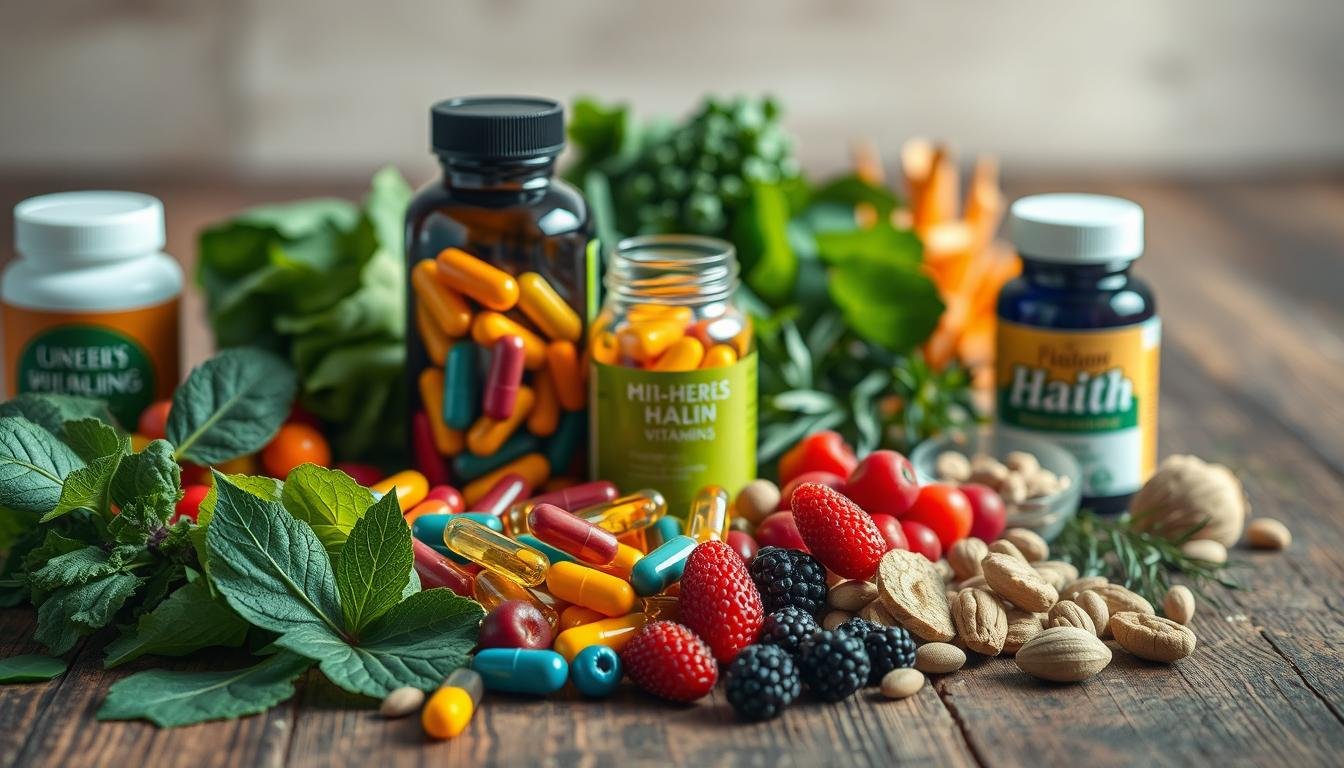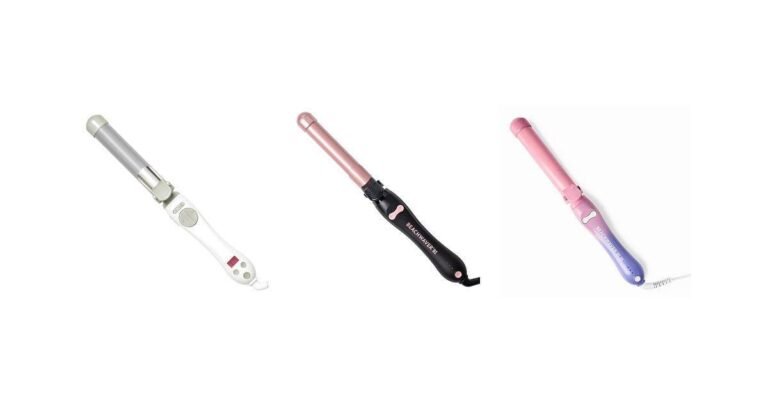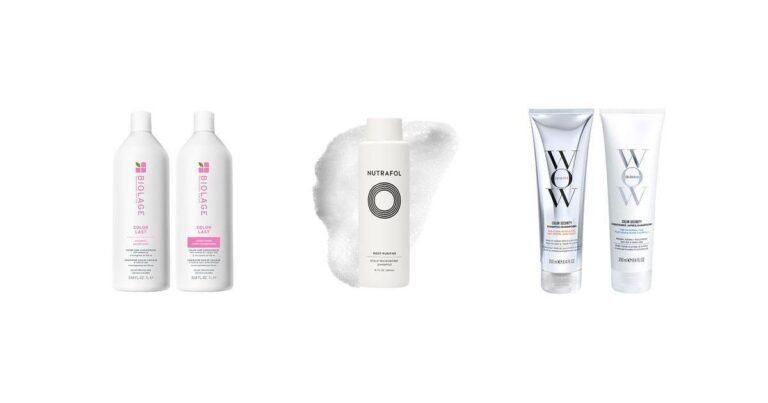What Vitamins Are Good for Hair Health? | Expert Guide
Did you know that an estimated 80 million Americans suffer from some form of hair loss or thinning? Despite the prevalence of this issue, many individuals are unaware of the crucial role that vitamins and nutrients play in maintaining healthy, vibrant hair. This expert guide will delve into the key vitamins that are Essential for hair growth, strength, and overall hair health, providing insights into their benefits, dietary sources, and recommended dosages.
Vitamins are vital for a wide range of bodily functions, including the health and vitality of our hair. While severe vitamin deficiencies are relatively uncommon in developed countries, even minor imbalances can contribute to issues like hair loss, thinning, and brittle strands. By understanding the specific vitamins that support hair health, individuals can take proactive steps to nourish their hair from the inside out and achieve the lush, lustrous locks they desire.
Key Takeaways
- Vitamins A, B complex, C, D, and E are Essential for maintaining healthy hair growth and strength.
- Biotin (vitamin B7) is a crucial hair-boosting nutrient that can help prevent hair loss and promote thicker, stronger strands.
- Omega-3 and omega-6 fatty acids work in tandem with vitamins to support scalp health and hair follicle function.
- Mineral deficiencies, such as zinc and iron, can also contribute to hair-related issues like thinning and shedding.
- Consulting a healthcare professional is recommended to assess individual vitamin and mineral needs and any potential risks associated with supplementation.
Introduction to Vitamins for Hair Health
Maintaining healthy, vibrant hair is a concern for many individuals. While genetics and various lifestyle factors play a role, the importance of vitamins in hair growth and overall hair health cannot be overstated. This comprehensive Guide aims to educate readers on the essential vitamins that support hair health, their specific benefits, and how to ensure adequate intake to address common hair issues.
Importance of Vitamins in Hair Growth
Vitamins are crucial nutrients that fuel the body’s processes, including the growth and maintenance of healthy hair. Deficiencies in key vitamins can contribute to a range of hair problems, such as thinning, breakage, and slow growth. By understanding the role of different vitamins, individuals can take proactive steps to nourish their hair from the inside out.
Overview of Common Hair Issues
Many individuals struggle with a variety of hair-related concerns, including hair loss, dullness, and lack of volume. These issues can often be linked to nutritional deficiencies, making it essential to address the underlying Causes. By identifying and addressing the root problems, individuals can work towards achieving stronger, healthier hair.
Goals of the Guide
This guide aims to provide a comprehensive overview of the essential vitamins for hair health, their sources, and their specific benefits. By equipping readers with this knowledge, the goal is to empower them to make informed decisions about their hair care regimen and take proactive steps towards maintaining beautiful, vibrant locks.
| Vitamin | Recommended Daily Intake | Potential Benefits for Hair |
|---|---|---|
| Vitamin A | 900 mcg RAE (men), 700 mcg RAE (women) | Supports scalp health and sebum production |
| Vitamin B Complex | Varies by B vitamin | Enhances hair growth and prevents thinning |
| Vitamin C | 90 mg (men), 75 mg (women) | Promotes collagen production for stronger hair |
| Vitamin D | 2,000-5,000 IU | Supports hair follicle health and growth |
| Vitamin E | 15 mg (22.5 IU) | Enhances blood circulation for healthier hair |
By understanding the role of these essential vitamins and incorporating them into a balanced diet or supplementation routine, individuals can take a proactive approach to addressing their hair health concerns and promoting stronger, more vibrant locks.
Key Vitamins for Hair Health
Maintaining healthy, vibrant hair requires a balanced intake of essential vitamins. Three key vitamins that play a crucial role in hair health are Vitamin A, Vitamin B Complex, and Vitamin C.
Vitamin A: Benefits for Scalp Health
Vitamin A is vital for the health of your scalp and the production of sebum, the natural oil that keeps your hair and scalp hydrated. The recommended dietary allowance (RDA) of vitamin A is 700 micrograms for women and 900 micrograms for men. Incorporating foods rich in vitamin A, such as leafy greens, carrots, and sweet potatoes, can promote a healthy scalp and support hair growth.
Vitamin B Complex: Hair Growth Enhancer
The Vitamin B complex, particularly biotin (Vitamin B7), is essential for hair growth and strength. Biotin helps to strengthen hair follicles and promote the production of keratin, a key structural protein in hair. Dr. Khetarpal recommends taking 3 to 5 milligrams of biotin daily. Eggs, nuts, and whole grains are excellent sources of the Vitamin B complex, including biotin.
Vitamin C: Role in Collagen Production
Vitamin C plays a vital role in the production of collagen, a protein that is crucial for healthy hair. Collagen helps to maintain the structure and integrity of hair follicles, preventing breakage and promoting growth. Citrus fruits, bell peppers, and broccoli are all excellent sources of Vitamin C, which can support overall hair health.
These three vitamins work synergistically to promote scalp health, hair growth, and hair strength. By incorporating a balanced diet rich in these essential nutrients, you can nourish your hair from the inside out and support the natural beauty and vitality of your tresses.
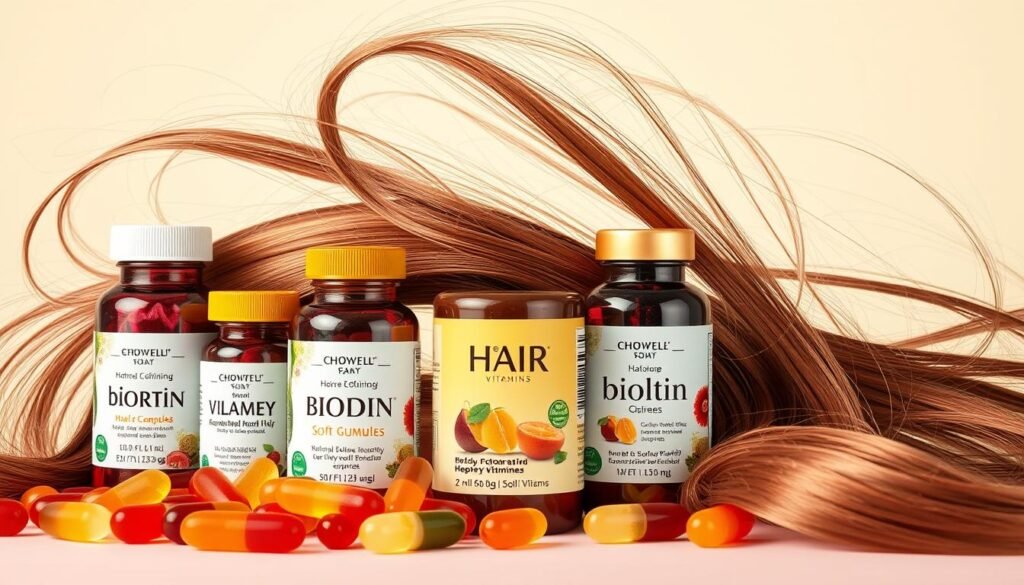
Biotin: The Hair-Boosting Vitamin
Biotin, also known as Vitamin B7, is a crucial nutrient for maintaining healthy hair. This water-soluble vitamin plays a vital role in promoting hair growth and preventing hair loss. Deficiency in biotin can lead to symptoms such as thinning hair, brittle nails, and various skin-related issues.
Deficiency Symptoms
While biotin deficiency is relatively rare in the United States, it can still occur due to factors like poor diet, certain medications, or underlying medical conditions. Some of the common symptoms associated with biotin deficiency include hair thinning, hair loss, and brittle nails.
Sources of Biotin
Fortunately, biotin is widely available in a variety of food sources. Foods that are rich in biotin include eggs, nuts, seeds, whole grains, and certain vegetables like sweet potatoes. The average intake of biotin in Western countries, excluding the United States, ranges from 35–70 mcg per day.
Recommended Dosage
The recommended adequate intake of biotin set by the Food and Nutrition Board is 30 mcg for adults and 35 mcg for women who breastfeed. However, healthcare professionals may prescribe higher doses of up to 5 milligrams (5,000 mcg) per day for individuals with biotin deficiencies. It’s important to consult with a healthcare provider before starting any biotin supplementation, as excessive intake can interfere with certain laboratory tests.
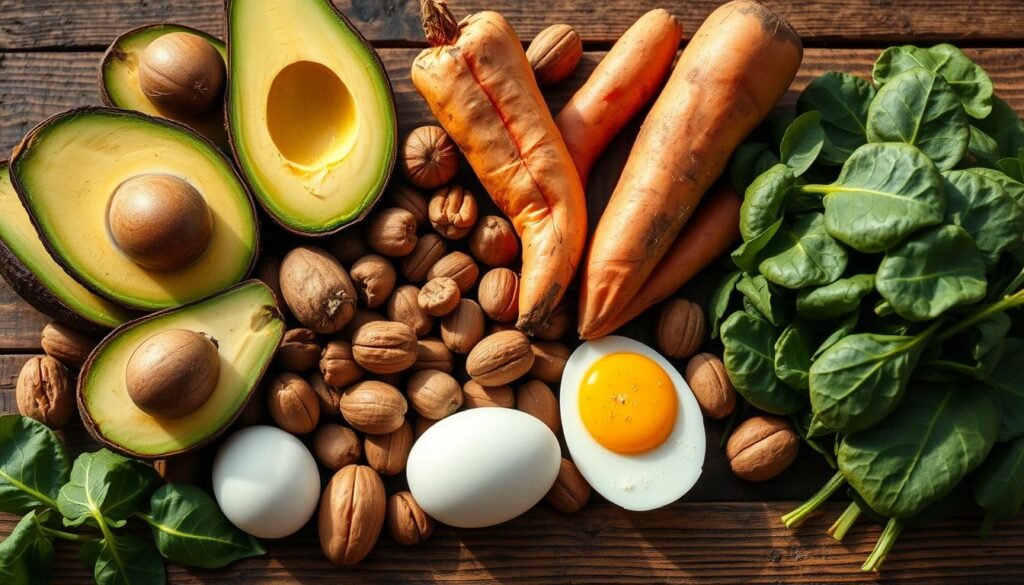
In conclusion, biotin is a crucial vitamin for maintaining healthy hair and nails. By incorporating biotin-rich foods into your diet or considering targeted supplementation under the guidance of a healthcare professional, you can support your hair health and address any potential deficiencies.
Vitamin D: Protecting Your Hair Follicles
Vitamin D is a crucial nutrient when it comes to maintaining healthy hair. This fat-soluble vitamin plays a vital role in hair follicle function and growth. In fact, recent research has suggested a connection between low serum vitamin D levels and certain hair loss conditions, like androgenetic alopecia and alopecia areata.
How Vitamin D Affects Hair Growth
Vitamin D is essential for regulating the hair follicle cycle. It helps promote hair thickness and growth, and studies have shown that increasing vitamin D levels can have a positive impact on hair health. Additionally, vitamin D deficiency can lead to thinning hair or increased hair loss.
Natural Sources of Vitamin D
Vitamin D is primarily obtained through sun exposure, as the skin can synthesize this nutrient when exposed to the sun’s ultraviolet B (UVB) rays. Food sources of vitamin D include fatty fish, egg yolks, and fortified dairy products and cereals. However, it can be challenging to get enough vitamin D from dietary sources alone, especially for those living in colder climates with limited sun exposure.
Recommended Intake
The recommended daily allowance of vitamin D for adults aged 19-55 is 600 IU or 15 mcg, according to the National Institute of Health (NIH). However, some research suggests that higher levels, up to 2,000-5,000 IU per day, may be more beneficial for those with hair loss or other hair-related concerns. Periodic testing of vitamin D levels with a healthcare professional is recommended, especially after the winter months, to ensure optimal levels are maintained.

In summary, vitamin D is a crucial nutrient for maintaining healthy hair follicles and promoting hair growth. By ensuring adequate sun exposure, consuming vitamin D-rich foods, and potentially supplementing with this nutrient, individuals can support their hair health and potentially mitigate certain types of hair loss.
Vitamin E: Antioxidant Benefits for Hair
Vitamin E is a powerful antioxidant that plays a crucial role in promoting scalp health and circulation. Limited research supports vitamin E hair benefits, but people use it for various reasons. In a study, vitamin E supplementation increased hair strands in participants with alopecia areata. Research findings on vitamin E’s role in treating hair loss are conflicting. Topical application of vitamin E oil on the scalp may prevent premature aging, expand capillaries, and increase blood flow. Research supports that applying oil to the hair enhances lubrication of the hair shaft and prevents breakage.
Food Sources Rich in Vitamin E
Vitamin E can be found in a variety of nutrient-dense foods, including:
- Almonds
- Sunflower seeds
- Spinach
- Avocados
- Vegetable oils
These vitamin E-rich foods can be easily incorporated into a balanced diet to support hair health. Vitamin E can also be obtained through supplements, but it’s important to be mindful of the recommended dosage to avoid potential side effects.
The Best Ways to Use Vitamin E for Hair
Vitamin E can be used in various ways to promote healthy hair:
- Topical Application: Applying vitamin E oil or serum directly to the scalp can help improve circulation and nourish the hair follicles.
- Dietary Intake: Consuming vitamin E-rich foods or taking supplements can provide the necessary antioxidants to protect hair from damage.
- Hair Treatments: Incorporating vitamin E into hair masks, conditioners, or other hair care products can help strengthen and protect the hair.
It’s important to consult with a healthcare professional before starting any new vitamin E regimen, as excess intake can lead to potential health risks.
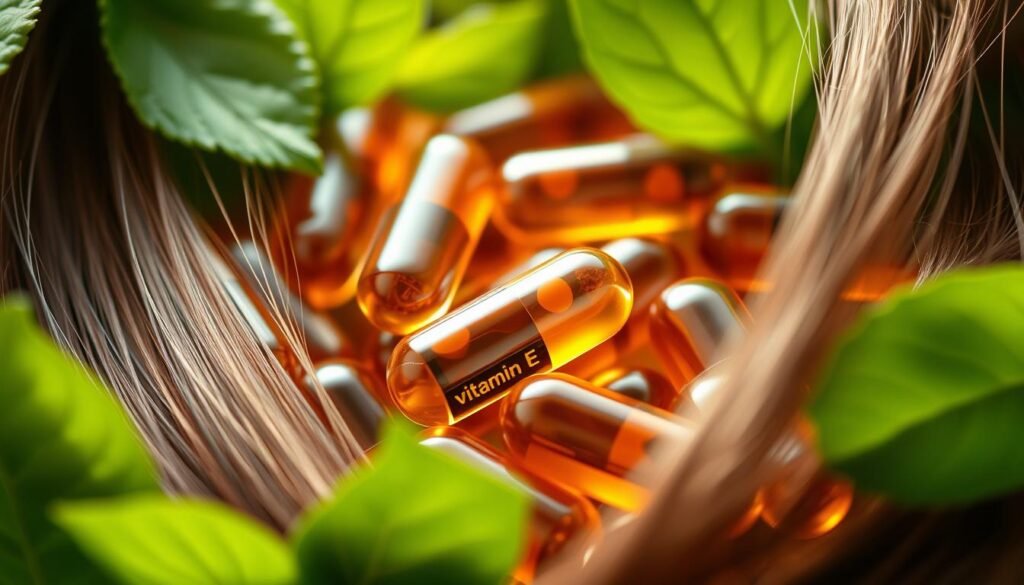
“Vitamin E is a powerful antioxidant that can help protect the hair from oxidative stress and promote overall hair health and growth.”
| Vitamin E Benefits for Hair | Potential Risks and Considerations |
|---|---|
|
|
In conclusion, vitamin E is a valuable nutrient for hair health, offering antioxidant benefits and promoting scalp circulation. By incorporating vitamin E-rich foods, topical treatments, and potentially supplements (under professional guidance), individuals can support their hair’s well-being and address various hair-related concerns. However, it’s important to be mindful of potential risks and consult with a healthcare professional before embarking on any new vitamin E regimen.
Omega Fatty Acids: Complementing Vitamin Role
While vitamins play a crucial role in maintaining healthy hair, omega fatty acids provide an equally important complement to this process. These essential fats nourish the hair follicles, reduce inflammation, and promote overall hair strength and growth.
Importance in Hair Health
Recent studies have highlighted the significant benefits of omega fatty acids for hair health. A 2018 study on rodents found that fish oil, a source of omega-3 fatty acids, stimulated hair growth, resulting in longer hair fibers in treated follicles compared to untreated ones. Additionally, a 2015 study on humans showed that a supplement containing omega-3 and omega-6 fatty acids led to participants having more hair in the active growth phase, thicker hair, and reduced hair loss compared to the control group. In fact, almost 90% of participants in the supplement group reported that their hair felt thicker and were experiencing less hair loss.
Sources of Omega-3 and Omega-6
Omega-3 fatty acids can be found in abundance in fatty fish such as salmon, tuna, sardines, mackerel, and herring. Plant-based sources of omega-3, including flaxseed oil, soybean oil, walnuts, and chia seeds, are also beneficial. Omega-6 fatty acids, on the other hand, are primarily found in vegetable oils and nuts.
Supplements vs. Dietary Sources
While supplements can provide a concentrated source of omega fatty acids, the American Heart Association suggests that consuming omega-3s from fish and seafood at least twice a week is more beneficial than using supplements. However, some research indicates that omega-3 fatty acids may also benefit heart health, arthritis symptoms, brain function, and vision by reducing the risk of certain conditions such as age-related macular degeneration. It’s important to consult with a healthcare professional to determine the appropriate balance between dietary sources and supplementation for individual needs.
Integrating omega fatty acids into your hair health routine, alongside a balanced intake of essential vitamins, can help promote stronger, healthier, and more resilient hair.
Minerals That Support Hair Health
While vitamins play a crucial role in maintaining healthy hair, minerals are equally essential for promoting hair growth and preventing hair loss. Three key minerals that have a significant impact on hair health are zinc, iron, and selenium.
Zinc: Essential for Hair Repair
Zinc is a vital mineral that aids in the repair and tissue growth of hair. Acquired zinc deficiency can occur due to factors like alcohol use disorder, pregnancy, and certain medications. Adequate zinc intake, ranging from 9-11 mg per day for adults, is necessary to support healthy hair structure and prevent thinning or shedding.
Iron: Preventing Hair Loss
Iron deficiency is a common issue, especially among women, and can contribute to excessive hair loss. A study found a link between decreased blood Ferritin levels (a compound of iron stored in the body) and hair loss in women. While the recommended daily intake of iron is 8-18 mg, it’s important not to exceed 60 mg/kg per day, as excessive iron can lead to serious health issues.
Selenium: Protecting Against Hair Damage
Selenium is a crucial mineral that helps in hair formation and regulates thyroid hormones, which are essential for hair growth. Deficiencies in selenium can result in dry, brittle hair and increased susceptibility to Hair Damage. Consuming foods rich in selenium, such as nuts, seeds, lean meats, and seafood, can help maintain healthy hair and protect against loss.
By ensuring a balanced intake of these essential minerals, individuals can support the overall health and vitality of their hair, reducing the risk of hair loss and promoting stronger, more vibrant locks.
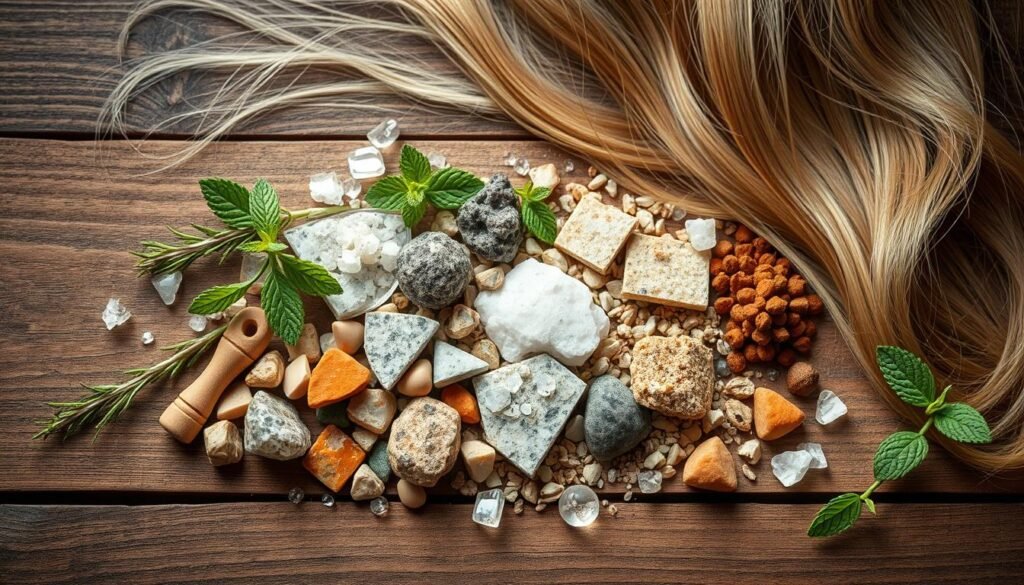
| Mineral | Recommended Daily Intake | Benefits for Hair Health |
|---|---|---|
| Zinc | 9-11 mg for adults | Aids in hair repair and tissue growth, prevents thinning and shedding |
| Iron | 8-18 mg, not to exceed 60 mg/kg | Helps prevent excessive hair loss, maintains healthy hair follicles |
| Selenium | Varied, found in nuts, seeds, lean meats, and seafood | Supports hair formation, regulates thyroid hormones for growth, protects against damage |
Balancing these essential minerals through a healthy, varied diet or targeted supplementation can significantly improve hair health and prevent unwanted hair loss.
The Role of Nutrition Beyond Vitamins
While vitamins play a crucial role in hair health, a balanced diet rich in nutrient-dense foods is equally important for maintaining strong, healthy hair. By focusing on a comprehensive approach to nutrition, individuals can support hair growth, strength, and overall quality.
Importance of a Balanced Diet
A balanced diet that includes a variety of lean proteins, fruits, vegetables, and whole grains can provide the essential nutrients needed for optimal hair health. Protein is particularly important, as it is the building block for hair follicles and strands. Carbohydrates, primarily from complex sources, also play a role in supporting the rate of cell division in hair follicles.
Foods That Nourish Hair Health
- Lean proteins: Eggs, chicken, fish, and legumes provide the amino acids necessary for hair growth.
- Fruits and vegetables: Colorful produce like peppers, spinach, and sweet potatoes are rich in vitamins A, C, and E, as well as minerals like iron and zinc, all of which are essential for hair health.
- Whole grains: Whole-wheat bread, brown rice, and oats contain B vitamins that support hair follicle health.
- Healthy fats: Avocados, nuts, and seeds provide omega-3 and omega-6 fatty acids, which can help reduce hair loss and increase hair density.
Hydration and Hair Quality
Staying hydrated is crucial for maintaining the health and quality of hair. Dehydration can lead to a dry, brittle scalp and hair, potentially contributing to hair loss. Drinking adequate amounts of water throughout the day can help nourish the hair and scalp, promoting stronger, more vibrant locks.
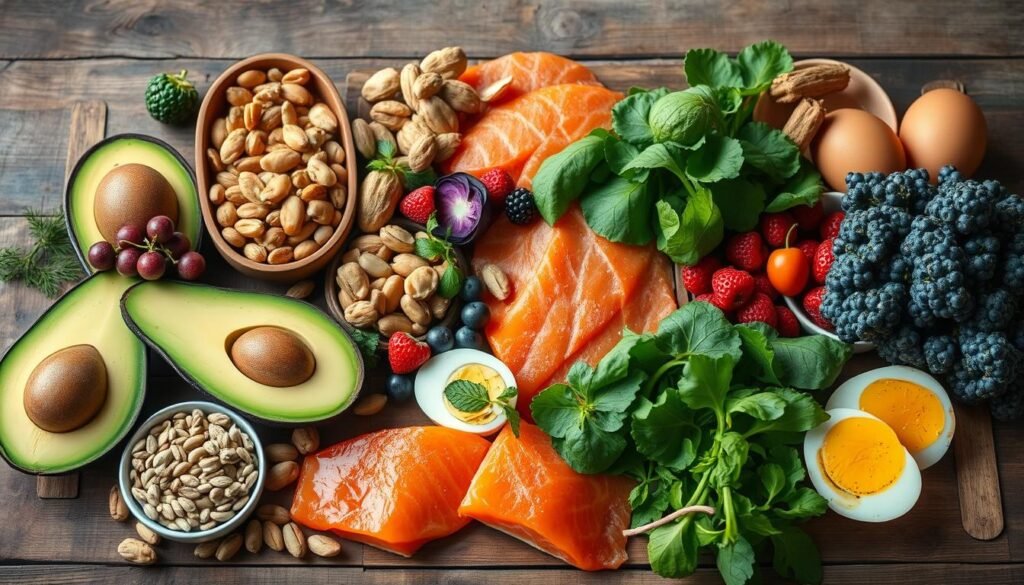
By focusing on a balanced diet rich in nutrient-dense foods and ensuring proper hydration, individuals can support the overall health and appearance of their hair, beyond just addressing specific vitamin deficiencies.
| Nutrient | Benefits for Hair Health | Food Sources |
|---|---|---|
| Protein | Essential for hair follicle and strand growth | Eggs, chicken, fish, legumes |
| Vitamin A | Promotes healthy scalp and hair follicles | Sweet potatoes, carrots, leafy greens |
| Vitamin C | Supports collagen production for strong hair | Citrus fruits, peppers, strawberries |
| Vitamin E | Provides antioxidant protection for hair | Almonds, avocados, leafy greens |
| Omega-3 and Omega-6 Fatty Acids | Help reduce hair loss and increase density | Flaxseeds, walnuts, fatty fish |
“Proper nutrition, including a balanced diet and adequate hydration, is essential for maintaining healthy, vibrant hair. By focusing on nutrient-rich foods, individuals can support the overall health and appearance of their locks.”
Lifestyle Factors Contributing to Hair Health
Maintaining healthy hair goes beyond just managing nutritional deficiencies. Lifestyle factors play a crucial role in the overall well-being and growth of our tresses. By addressing stress management, sleep quality, and avoiding harmful hair practices, we can cultivate an environment that supports vibrant, resilient hair.
Stress Management Techniques
Chronic stress can take a toll on our hair, leading to increased shedding and slowed growth. Regular physical activity enhances blood circulation throughout the body, including to the scalp, promoting growth and vitality of hair follicles. Practices like meditation, yoga, and deep breathing can help manage stress levels and create a more favorable environment for healthy hair development.
The Impact of Sleep on Hair Growth
Poor sleep quality can disrupt hormone levels and the body’s ability to regenerate, potentially contributing to hair loss over time. Ensuring adequate, quality sleep is essential for optimal hair growth. The timeline for noticing results from lifestyle changes in hair health can vary from a few weeks to a few months, depending on individual factors like genetics and the extent of previous damage.
Avoiding Harmful Hair Practices
Certain hairstyles and Hair Care habits can inadvertently damage our tresses. Certain hairstyles, such as loose braids or buns, can help prevent hair loss by minimizing tension on hair follicles and the scalp. Avoiding excessive heat styling, tight hairstyles, and harsh chemical treatments can go a long way in preserving the health and integrity of our hair.
By incorporating stress management techniques, prioritizing quality sleep, and adopting gentler Hair Care practices, we can create a holistic approach to supporting our hair’s vitality. If a well-balanced diet provides all essential nutrients, additional supplements for hair health may not be necessary; however, supplements might be beneficial if deficiencies exist or are recommended by a healthcare professional.

“Healthy hair is a reflection of our overall well-being. By addressing lifestyle factors, we can unlock the full potential of our luscious locks.”
| Lifestyle Factor | Impact on Hair Health | Recommended Practices |
|---|---|---|
| Stress Management | Chronic stress can contribute to increased shedding and slowed growth. | Engage in stress-reducing activities like meditation, yoga, and deep breathing. |
| Sleep Quality | Poor sleep quality can disrupt hormone levels and regenerative processes, leading to hair loss. | Prioritize getting adequate, quality sleep for optimal hair growth. |
| Hair Care Practices | Certain hairstyles and treatments can damage hair and lead to breakage and thinning. | Avoid excessive heat styling, tight hairstyles, and harsh chemicals. Opt for gentler hair Care Routines. |
By addressing these key lifestyle factors, we can create an environment that nurtures and supports the health and vitality of our hair. Remember, a holistic approach to hair care, combining proper nutrition with healthy lifestyle habits, is essential for achieving and maintaining stunning, resilient locks.
Supplementation: When to Consider It
When it comes to supporting healthy hair, the importance of proper nutrition cannot be overstated. While a balanced diet is the foundation for hair health, sometimes supplementation may be necessary to address specific deficiencies or support hair growth.
Understanding the Need for Supplements
Nutrient deficiencies, such as a lack of biotin, vitamin D, or vitamin A, can contribute to various hair-related issues, including thinning, shedding, and poor growth. In such cases, supplements can help bridge the gap and provide the necessary nutrients to support healthy hair.
How to Choose the Right Hair Vitamins
When selecting hair supplements, it’s crucial to look for reputable brands that use high-quality, bioavailable ingredients. Some top-rated options include Nutrafol Hair Wellness Supplement ($79, 4.2/5 stars on Amazon), Nature’s Bounty Hair, Skin, and Nails Gummies ($29, 4.7/5 stars on Amazon), and Grande Cosmetics GrandeGUMMIES Vegan Collagen Booster ($30 on Amazon, $21 at Ulta Beauty and Sephora, 4.4/5 stars on Amazon).
Potential Side Effects to Watch For
While hair supplements are generally safe when taken as directed, it’s essential to be aware of potential side effects, such as digestive issues or interactions with medications. Always follow the recommended dosage guidelines and consult with a healthcare professional before starting any new supplement regimen.
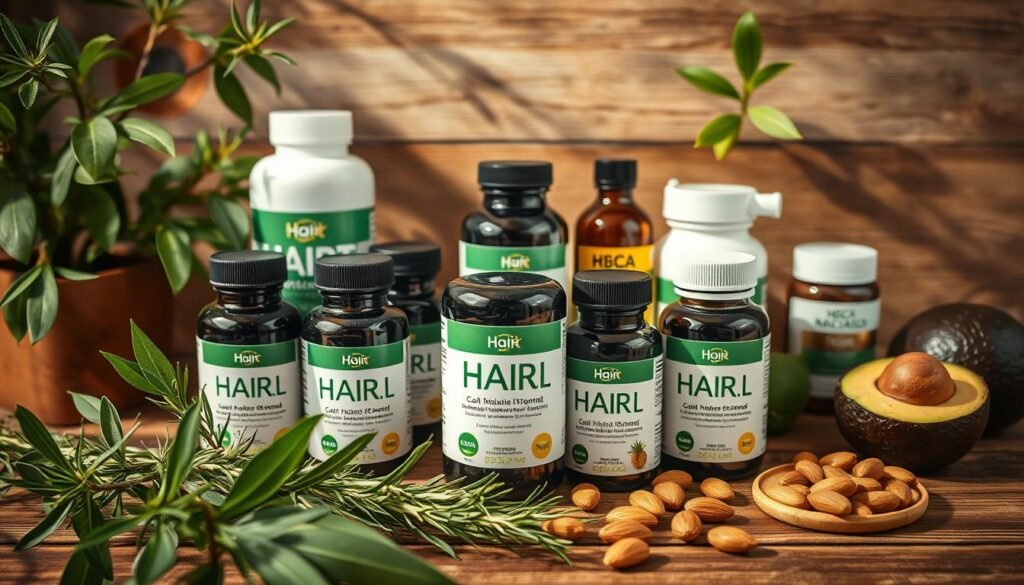
Ultimately, supplementation should be considered when dietary intake is insufficient or deficiencies are present. By choosing the right hair vitamins and being mindful of potential side effects, you can support your hair health and achieve the luscious locks you desire.
Consulting with a Healthcare Professional
When it comes to maintaining healthy hair, individual assessments by healthcare professionals are crucial. Seeking the guidance of a qualified expert can help address any significant hair loss, thinning, or changes in hair texture that you may be experiencing. By evaluating your personal health history, nutrient deficiencies, and specific hair concerns, healthcare professionals can provide tailored recommendations to optimize your hair health.
Importance of Individual Assessments
Every person’s hair health needs are unique, and a personalized approach is essential for achieving the best results. Healthcare professionals can conduct thorough assessments, taking into account factors such as your lifestyle, medical conditions, and current hair care routine. This holistic evaluation allows them to identify any underlying issues and develop a targeted plan to address your specific hair health concerns.
When to Seek Help for Hair Issues
If you are experiencing significant hair loss, thinning, or noticeable changes in the texture or quality of your hair, it is advisable to seek the guidance of a healthcare professional. Excessive shedding, beyond the normal range of 50-100 hairs per day, may indicate an underlying condition that requires professional attention. They can help determine the root cause and provide appropriate treatment options to support your hair health.
Tailored Recommendations for Hair Health
Based on your individual assessment, healthcare professionals can recommend personalized strategies to improve your hair health. This may include dietary adjustments, targeted supplementation, or lifestyle modifications to address any nutritional deficiencies or other contributing factors. By following a tailored approach, you can achieve optimal hair growth, strength, and overall vitality.

Consulting with a healthcare professional is the best way to ensure your hair health is assessed and addressed in a personalized manner. By working closely with an expert, you can develop a comprehensive plan to support your hair’s resilience and appearance, ultimately leading to healthier, more vibrant locks.
Conclusion: The Path to Healthier Hair
Achieving and maintaining healthy hair is a holistic endeavor that requires a harmonious balance of essential vitamins, minerals, and proper care. The key nutrients for hair health include Vitamin A, the Vitamin B complex, Vitamin C, Vitamin D, Vitamin E, as well as minerals like zinc and iron. These vital components work together to support scalp health, promote hair growth, enhance strength and elasticity, and shield hair follicles from damage.
Recap of Essential Vitamins and Minerals
Vitamin B complex, including Biotin (Vitamin B7), is crucial for converting nutrients into energy and strengthening hair. Vitamin C boosts collagen production and iron absorption, while Vitamin D stimulates follicle growth and prevents hair loss. Additionally, Vitamin E promotes scalp health, tissue repair, and improved blood flow to the scalp, all of which are essential for healthy hair. Minerals like zinc and iron also play pivotal roles in hair tissue growth, repair, and overall hair health.
Long-Term Habits for Hair Maintenance
Maintaining a balanced, vitamin-rich diet with adequate protein, omega-3 fatty acids, and hydration is crucial for long-term hair care. Incorporating stress management techniques and prioritizing quality hair health maintenance can further support the health and resilience of your tresses. Consistency is key, as regular attention to your nutritional needs and hair care practices will lead to stronger, more vibrant hair over time.
Encouragement for Ongoing Care
Remember, your hair is a reflection of your overall well-being, and with the right approach, you can achieve and maintain healthy, beautiful hair. Stay committed to nourishing your locks with the essential vitamins and minerals, while also embracing a holistic lifestyle that supports your hair’s vitality. With patience and persistence, you can embark on the path to healthier, more resilient hair that will serve you well for years to come.
FAQ
what are the key vitamins for hair health?
The key vitamins for hair health include Vitamin A, Vitamin B complex (especially biotin), Vitamin C, Vitamin D, and Vitamin E. These vitamins play crucial roles in supporting scalp health, hair growth, strength, and overall quality.
How does biotin (Vitamin B7) benefit hair?
Biotin, also known as Vitamin B7, is crucial for hair health. It supports hair growth and strength, and a deficiency can lead to thinning hair and brittle nails. The recommended daily intake is 30 mcg, but higher doses up to 5,000 mcg are often used for hair growth purposes.
what is the role of Vitamin D in hair health?
Vitamin D is essential for hair follicle health and growth. It can be obtained through sun exposure, diet, and supplements. Deficiency is common, especially in colder climates, and experts recommend 2,000-5,000 IU of Vitamin D daily for adults, with annual blood level checks.
How do minerals contribute to hair health?
Minerals like zinc, iron, and selenium play important roles in hair health. Zinc aids in hair repair and tissue growth, iron deficiency is linked to hair loss, and selenium protects against oxidative damage. Balancing these minerals through diet or supplements can significantly improve hair health and prevent loss.
What lifestyle factors impact hair health?
Lifestyle factors like stress management, adequate sleep, and avoiding harmful hair practices (such as excessive heat styling and tight hairstyles) can significantly impact hair health. A holistic approach that combines proper nutrition with healthy habits is essential for optimal hair health.
When should one consider hair vitamin supplements?
Supplements should be considered when dietary intake is insufficient or deficiencies are present. It’s important to choose supplements based on individual needs and potential deficiencies, and to consult healthcare professionals. Potential side effects and interactions with medications should also be taken into account.
Why is it important to consult a healthcare professional for hair health concerns?
Individual assessments by healthcare professionals are crucial for addressing hair health concerns. Professionals can provide tailored recommendations based on personal health history, nutrient deficiencies, and specific hair concerns. This personalized approach ensures the most effective treatment for individual hair health needs.
